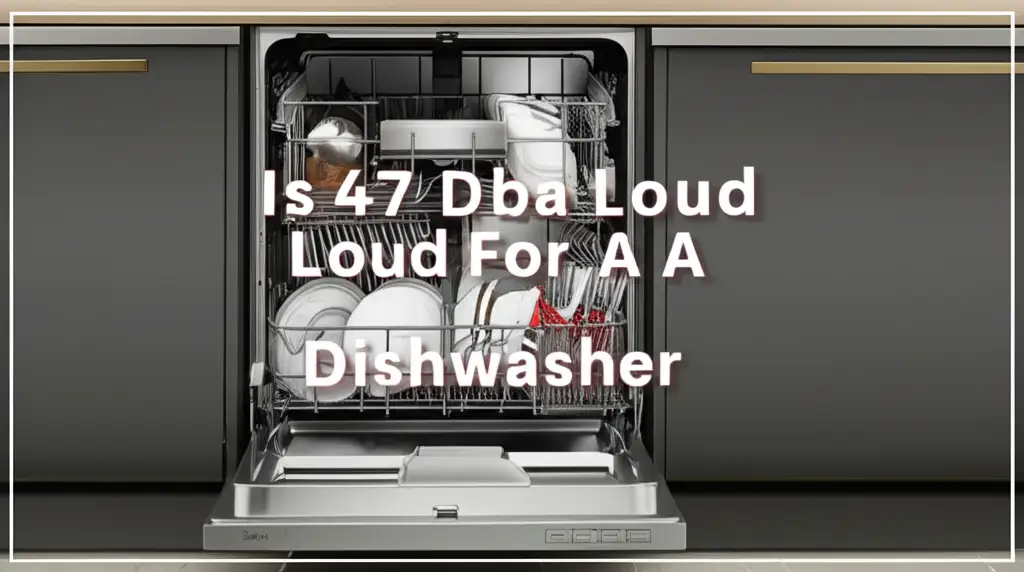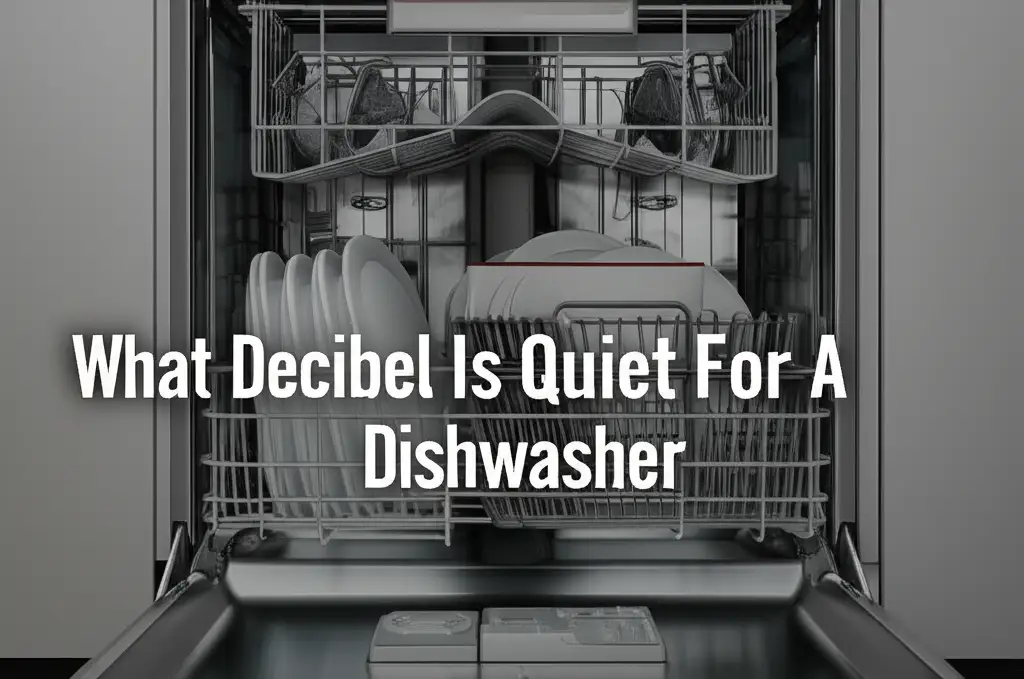· Mason Everett · Dishwashers · 10 min read
Is 47 Dba Loud For A Dishwasher

Is 47 dBA Loud for a Dishwasher? Understanding Dishwasher Noise
Imagine settling down for a quiet evening. Suddenly, a noisy appliance disrupts your peace. This often happens with dishwashers. Many homeowners ask: “Is 47 dBA loud for a dishwasher?” This question is important for kitchen comfort. I understand this concern. A loud dishwasher can impact your home’s ambiance.
Knowing dishwasher noise levels helps you choose well. It also helps you understand your current appliance. We will discuss decibel ratings. We will explain how sound levels affect daily life. This article outlines factors influencing dishwasher noise. It also provides tips for a quieter kitchen. We will cover maintenance. We will also look at buying considerations. This guide helps you make informed decisions about dishwasher sound.
Takeaway
- 47 dBA for a dishwasher is generally considered quiet. It blends into background noise.
- Decibel ratings help compare appliance sound levels. Lower numbers mean quieter operation.
- Installation, loading, and maintenance affect how loud a dishwasher runs.
- A quiet dishwasher improves kitchen comfort, especially in open-plan homes.
- Regular cleaning and proper loading can reduce existing dishwasher noise.
47 dBA for a dishwasher is not loud. It is a quiet noise level. This sound level is often compared to a quiet library or soft conversation. Most people find 47 dBA dishwashers barely noticeable during operation. They are good for open-concept living spaces.
Understanding dBA: What Do Decibels Mean for Dishwashers?
Decibels measure sound intensity. The “A” in dBA means A-weighted. This scale mimics how the human ear perceives sound. It gives more weight to frequencies humans hear best. A lower dBA number means less noise. A higher dBA number means more noise.
Dishwasher noise levels vary greatly. Older models might run at 60 dBA or higher. This level is like normal conversation. Newer, quieter models can go as low as 38 dBA. This level is almost silent. Understanding this scale helps you set expectations. It also helps you compare different models.
Most quiet dishwashers range from 40 to 49 dBA. Anything below 50 dBA is often labeled as quiet. A rating of 47 dBA places a dishwasher firmly in this quiet category. It will not disturb your daily activities. It allows for normal conversation nearby. Knowing what dBA means helps you pick the right appliance. It ensures peace in your kitchen space.
The 47 dBA Threshold: Is It Quiet or Noticeable?
A dishwasher rated at 47 dBA is quiet. Most people find this sound level very low. It does not stand out in a typical home environment. To give you perspective, a quiet library is around 40 dBA. A normal conversation might be 50-60 dBA. The hum of a refrigerator is often around 40 dBA.
So, 47 dBA is quieter than many common household sounds. It means your dishwasher will likely blend into the background. You might hear it operating if you are right next to it. You will likely not notice it from another room. This quietness is a major benefit. It allows for more peaceful evenings at home.
Many people seek quiet appliances. This is especially true for open-concept homes. A 47 dBA dishwasher supports this desire. It lets you run cycles anytime. You will not disturb sleeping children or TV watching. This level is a good balance of performance and quiet operation for most budgets. It offers significant comfort.
Factors Influencing Dishwasher Noise Beyond dBA Rating
A dishwasher’s dBA rating gives you a good idea of its quietness. However, other factors also influence how loud it sounds in your home. Installation plays a big role. A poorly installed dishwasher can vibrate. This vibration can create extra noise. Make sure the dishwasher is level. Secure it properly to the countertop or cabinets.
The type of flooring also matters. Hard surfaces like tile or wood can amplify sound. Carpets or rugs absorb sound. Dishwasher loading practices affect noise. Overloading can cause dishes to rattle. Incorrectly placing items blocks spray arms. This can lead to inefficient washing and more noise. Some materials, like plastic, can be louder than glass during washing cycles.
The age and condition of your dishwasher also contribute to its sound level. Older components can wear out. This might lead to buzzing or grinding sounds. Components like the drain pump or wash pump can become noisy. If your dishwasher starts making unusual noises, it may need attention. For example, if you notice your dishwasher buzzing, it usually means a part needs checking. Understanding these factors helps you manage overall noise.
Benefits of a Quiet Dishwasher in Your Home
A quiet dishwasher offers many advantages. Modern homes often feature open-concept designs. Kitchens flow into living and dining areas. In these spaces, appliance noise is more noticeable. A quiet dishwasher keeps your home peaceful. You can run it during dinner parties without disruption. You can watch a movie in the living room without a loud hum.
Quiet dishwashers improve daily comfort. You can run a cycle after dinner. You will not disturb sleeping family members. This flexibility is great for busy households. It allows you to take advantage of off-peak energy hours. Many people value a calm home environment. A quiet dishwasher helps achieve this.
It also supports mental well-being. Constant noise can be stressful. A quiet appliance reduces background distractions. This helps create a more serene living space. Investing in a quiet dishwasher means investing in your home’s peace. It enhances the overall living experience for everyone. This quietness allows for better concentration. It lets you enjoy home activities more fully.
How to Measure and Reduce Dishwasher Noise
If you think your dishwasher is too loud, you can measure its noise. Use a sound level meter or a smartphone app. These tools provide an approximate dBA reading. Take readings from different distances. This helps you understand the sound’s spread. Knowing the actual noise helps you decide if action is needed.
Reducing noise involves a few steps. First, check the installation. Ensure the dishwasher is level and stable. Make sure it sits securely in its opening. Loose connections cause vibrations. Second, load dishes correctly. Do not overload the racks. Keep items from touching spray arms. Refer to your owner’s manual for proper loading techniques.
Third, look for internal issues. If your dishwasher makes new noises, investigate. A buzzing sound can point to motor or pump problems. Debris in the pump can cause grinding. Ensure nothing blocks the spray arms. Sometimes, proper maintenance can make a big difference. For instance, knowing how to get the dishwasher to drain properly can prevent water buildup which sometimes leads to noise. Simple fixes often reduce noise effectively.
Choosing a Quiet Dishwasher: What to Look For
When buying a new dishwasher, noise level is a key feature. Always check the dBA rating. Look for models under 50 dBA for quiet operation. Dishwashers in the 40-45 dBA range are exceptionally quiet. They are a good choice for open-concept homes. Different brands offer quiet models. Researching brands helps. Some brands specialize in quiet appliances.
Consider the materials used inside the dishwasher. Stainless steel tubs absorb sound better than plastic tubs. They also retain heat for better drying. Insulation around the tub also helps. Look for models with extra layers of sound dampening. These layers can include bitumen, cotton, or asphalt sheets. They prevent sound from escaping.
Think about the motor type. Brushless motors often run quieter than traditional motors. They also tend to last longer. Features like food disposers can add noise. Some quiet models use filtration systems instead. This avoids the noise of a grinding disposer. Comparing models helps you find the quietest option within your budget. Understanding how much a dishwasher costs can help balance your budget with your desire for a quiet model. You may also want to explore what dishwashers are made in the USA if domestic manufacturing is important to you.
Maintenance for a Quieter Dishwasher Experience
Regular maintenance helps keep your dishwasher quiet. The filter is a common source of noise. Food particles and grease can clog it. A clogged filter makes the motor work harder. This creates more noise. Clean your dishwasher filter often. Your manual will tell you how often you should clean your dishwasher filter. This is a simple task that takes minutes.
Check the spray arms. Food debris can block the small holes. This affects water distribution. It can also cause rattling or spraying noises. Remove the spray arms and clean them. Make sure they spin freely. Also, check the gasket around the door. A worn gasket can cause leaks and vibrating noises. Replace it if it looks damaged.
Use a dishwasher cleaner regularly. This removes mineral buildup and soap scum. Buildup can affect water flow and performance. It can also lead to strange noises. Knowing how to use dishwasher cleaner correctly helps maintain the appliance. If you notice a strange smell or visible grime, learning how to clean mold off a dishwasher can also improve efficiency and quietness. Proper care extends your dishwasher’s life. It also ensures it runs quietly and efficiently.
FAQ Section
What is a good dBA for a quiet dishwasher?
A good dBA for a quiet dishwasher is generally below 50 dBA. Many excellent models fall into the 40-45 dBA range. These models are very quiet. They are perfect for homes with open living spaces. They allow you to run the dishwasher anytime without disturbance.
Why is my dishwasher suddenly loud?
Your dishwasher may suddenly become loud due to several reasons. A common cause is a clogged filter or spray arms. Debris can block parts. Loose dishes rattling inside are another reason. Internal parts like the pump or motor might also be failing. Check for proper loading and regular cleaning.
Does a quieter dishwasher cost more?
Quieter dishwashers often cost more than noisier ones. This is because they use better insulation and more advanced motor technology. These features add to the manufacturing cost. However, the investment can be worth it for increased home comfort. Many find the peace and quiet invaluable.
Can proper loading affect dishwasher noise?
Yes, proper loading significantly affects dishwasher noise. Overloading the dishwasher can cause dishes to rattle. Items can also block spray arms. This leads to inefficient cleaning and increased noise. Make sure dishes are spaced out. Place larger items carefully. Follow your dishwasher’s loading guidelines for best results.
How can I make my old dishwasher quieter?
You can make an old dishwasher quieter. First, ensure it is level and stable. Tighten any loose screws. Clean the filter and spray arms regularly. Check the door gasket for wear. Adding sound dampening mats around the dishwasher’s exterior can also help. Sometimes, replacing a noisy part like a pump can reduce sound.
Conclusion
Understanding “Is 47 dBA loud for a dishwasher” is simple. A 47 dBA dishwasher is considered quiet. It integrates well into any home setting. This sound level offers a comfortable kitchen environment. It means you can enjoy peaceful moments. You do not need to worry about appliance noise.
Choosing a quiet dishwasher improves your home’s comfort. It adds value to your daily life. Remember to consider dBA ratings when buying. Also, perform regular maintenance. These steps ensure your dishwasher runs as quietly as possible. A well-maintained dishwasher makes less noise. It also lasts longer. Prioritize quietness in your next appliance choice. Create a more serene home for yourself and your family. Your quiet kitchen will thank you.





